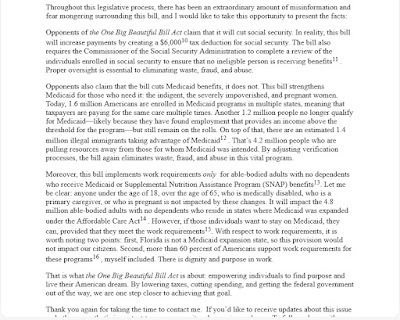Once, it felt like “This land was made for you and me,” as the Woody Guthrie song goes.
Never before have I felt so disenfranchised. America may have always fallen short of being a “perfect union,” but over my lifetime, racial, gender, and economic equality grew, and the “American Dream” became more tangible. That is, until Donald Trump purloined the Republican Party.
Between the Texas flood tragedy and the passage of the “One Big Beautiful Bill (OBBB),” I was hardly in the mood to “celebrate” July 4, as our unalienable rights seem to be dwindling and American institutions are being dismantled, one by one. January 6, 2021 should have put an end to it all, but DJT has proven himself an escape artist extraordinaire, and the beneficiary of extraordinary luck.
I daresay I am not alone in lamenting what we have lost and what we are becoming. As former Treasury Secretary Larry Summers wrote in a recent New York Times Op-Ed, Lawrence Summers: This Law Made Me Ashamed of My Country Everything that’s wrong seems to coalesce in the OBBB—not only in its substance but in how it will be cynically implemented. The tax “benefits” arrive just in time for the 2026 midterms, while the real pain—cuts to Medicare, food aid, clean energy, student loan programs, affordable housing, and rural hospitals—hits afterward. The political calculation is as cunning as it is cruel.
Until now, I felt our country stood for assimilating generations of immigrants fleeing persecution or simply seeking a better life. (“Give me your tired, your poor, your huddled masses yearning to breathe free,” as Emma Lazarus’ poem on Lady Liberty’s pedestal proclaims.) Now, empathy has vanished—replaced by false narratives portraying undocumented immigrants as the primary source of crime. While some do commit offenses, studies show they do so at lower rates than native-born citizens. Now, with the OBBB’s massive funds for ICE and deportation centers, MAGA lawmakers gleefully cheered, thinking anyone trying to escape “Alligator Alcatraz” would be torn apart by the Everglades wildlife. Reportedly, when the President toured the facility with Governor DeSantis and ICE Barbi Kristi Noem, he supposedly said, “Biden wanted me in here, that son of a bitch.”
The OBBB reallocates resources, shifting funding from social safety nets and clean energy to tax cuts, immigration enforcement, and national defense. But the math doesn’t add up, and the bill is estimated to add more than $3.3 trillion to the national debt over the next decade.
Here’s another reason to feel disenfranchised: While the OBBB was being formulated, what is an ordinary citizen to do? I wrote letters to my Senators, Rick Scott and Ashley Moody, as well as to my representative, Brian Mast. I even called. All are MAGA Republicans, but I felt I had to make my arguments against passing the OBBB, particularly focusing on the unsustainability of the deficit. Except for Brian Mast, I received brief formula responses that extolled how hard they were working for Floridians and how much they “appreciated” my views.
Representative Brian Mast did not reply until after the OBBB was signed into law. His was a detailed (but formula) response which is below in a four-part screenshot.
Claim: “This bill secures the border,
reins in wasteful spending, and reignites economic growth.”
Reality: This is a vague and unsubstantiated assertion. The bill’s core
function is massive tax reduction, not meaningful deficit reduction or targeted
infrastructure investment.
Claim: “Extends the 2017 tax cuts that unleashed our economy.”
Reality: The 2017 tax cuts provided short-term growth but not enough to offset
revenue loss. The national debt increased by over $2 trillion post-enactment,
even before COVID.
Claim: “Across every income level, Americans got a break…”
Reality: While marginal tax rates decreased, the effective tax relief was
minimal and temporary for most. The wealthy received permanent, far larger
benefits.
Claim: “Increases the child tax credit from $2,000 to $2,200.”
Reality: This $200 increase does not compare to the temporary 2021 expansion
that lifted millions out of poverty. Many low-income families remain excluded
due to refundability limits.
Claim: “Cuts taxes on tips, overtime, and Social Security.”
Reality: These cuts offer modest benefits and are not offset. Cutting Social
Security taxes may actually weaken the trust fund’s solvency over time.
Claim: “Fully funds Trump’s border wall… hires more border patrol… empowers
Coast Guard.”
Reality: Border wall funding is a separate issue and cannot justify
multi-trillion-dollar tax cuts. These provisions serve as emotional appeals,
not fiscal justification.
Claim: “Increases Social Security payments by creating a $6,000 tax deduction.”
Reality: This is misleading. It doesn’t increase benefit payments—just allows
some recipients to reduce taxable income, with limited real impact.
Claim: “Strengthens Medicaid by eliminating fraud and abuse.”
Reality: Fraud should be addressed, but even perfect fraud elimination does not
offset the massive cost of the tax cuts. This is a political talking point, not
a fiscal plan.
Claim: “Work requirements apply only to able-bodied adults without dependents.”
Reality: These requirements often create administrative burdens that remove
eligible people. The cost savings are limited, and the societal harms can be
significant. The bill's changes to work requirements and funding could result
in nearly 12 million people losing health coverage.
Claim: “This bill empowers individuals to live the American Dream.”
Reality: The bill’s structure overwhelmingly favors the wealthy and deepens the
deficit. Real empowerment comes from opportunity, fairness, and
sustainability—not debt-financed tax cuts.
Note: This analysis and rebuttal were drafted with the assistance of ChatGPT, a language model developed by Open AI, to help ensure clarity, factual grounding, and accessibility. The conclusions drawn are my own.
Looking ahead, I fear the OBBB will cause massive dislocations in our society: deepening inequality, increasing cruelty toward law-abiding, tax-paying migrants, and continuing the decimation of core American institutions—health, education, and justice. Even more concerning, it undermines the very idea of America as a nation others can trust. The long-term economic, political, and social consequences are staggering—and potentially irreversible.










